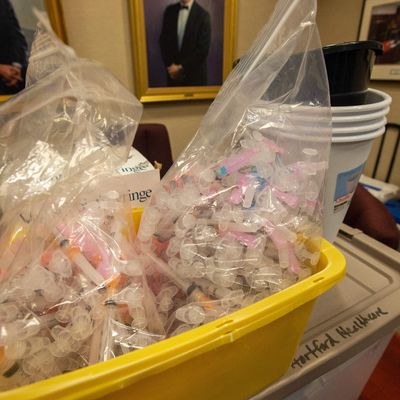
With the United States sitting on the rights to over 1.41 billion vaccine shots, the Biden administration has rightfully been criticized as a contributor to the vaccine-hoarding crisis impeding the global inoculation effort. And with state supply provided by the federal government no longer exceeding local demand in many areas, millions of doses are set to expire this summer — doses that could be allocated to nations that have received negligible supply amid the shot-in-arms race among wealthy countries over the past year. But as STAT News reports, these shots have not been shipped overseas, though several state health departments have repeatedly requested that the federal government send them abroad.
According to an estimate by the Kaiser Family Foundation, there are over 26 million excess doses in state reserves, many of which are set to expire this summer or early fall. “We’re drowning in this stuff,” Robert Ator, an Arkansas Air National Guard member leading the state’s vaccine distribution effort, told STAT News. “It’s starting to get a bit silly and we want to make sure we’re being good stewards.” Despite 100,000 shots set to expire at the end of July, the federal government hasn’t been able to reallocate them, citing logistical issues. Other states are facing similar problems: Delaware has 25,768 shots expiring in August, Colorado has 352,533 doses expiring this summer, and North Carolina has 119,756 doses expiring in July and another 854,548 expiring in August.
While the Biden administration pledged last month to donate 500 million vaccines throughout the world — a significant gift, but far short of the 11 billion estimated by the World Health Organization required to end the pandemic — the bulk of these shots have not yet been produced. The appeal of figuring out the logistics to ship the expiring shots abroad is that they can be effective now, if only in relatively small numbers. “They’re real doses sitting on shelves and not waiting to be manufactured,” Jenny Ottenhoff, senior policy director at the global health nonprofit ONE Campaign, told STAT News. “That could change the game in terms of speed. Right now, the most important thing in terms of sharing doses internationally is sharing it fast.” The demand is there, even if it is not in the states: Global hotspots currently include Botswana, Libya, and Namibia, nations which have all administered fewer than 500,000 doses each.






























